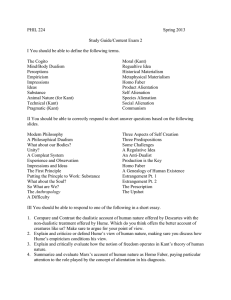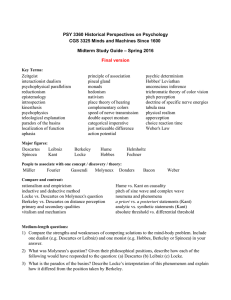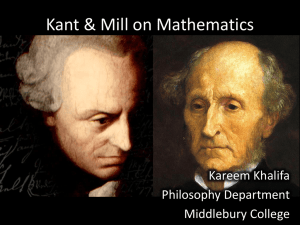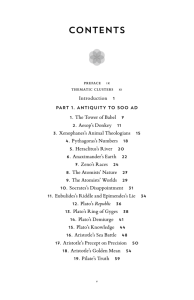PLEASE NOTE this is a sample reading list for the... may change from year to year.
advertisement
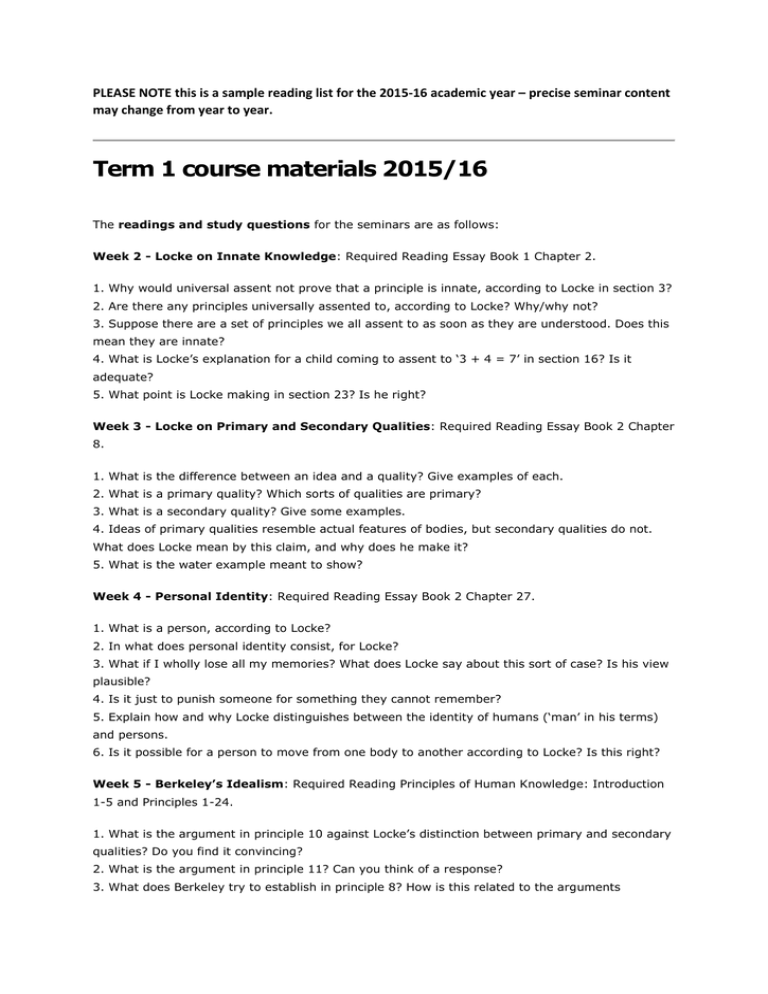
PLEASE NOTE this is a sample reading list for the 2015-16 academic year – precise seminar content may change from year to year. Term 1 course materials 2015/16 The readings and study questions for the seminars are as follows: Week 2 - Locke on Innate Knowledge: Required Reading Essay Book 1 Chapter 2. 1. Why would universal assent not prove that a principle is innate, according to Locke in section 3? 2. Are there any principles universally assented to, according to Locke? Why/why not? 3. Suppose there are a set of principles we all assent to as soon as they are understood. Does this mean they are innate? 4. What is Locke’s explanation for a child coming to assent to ‘3 + 4 = 7’ in section 16? Is it adequate? 5. What point is Locke making in section 23? Is he right? Week 3 - Locke on Primary and Secondary Qualities: Required Reading Essay Book 2 Chapter 8. 1. What is the difference between an idea and a quality? Give examples of each. 2. What is a primary quality? Which sorts of qualities are primary? 3. What is a secondary quality? Give some examples. 4. Ideas of primary qualities resemble actual features of bodies, but secondary qualities do not. What does Locke mean by this claim, and why does he make it? 5. What is the water example meant to show? Week 4 - Personal Identity: Required Reading Essay Book 2 Chapter 27. 1. What is a person, according to Locke? 2. In what does personal identity consist, for Locke? 3. What if I wholly lose all my memories? What does Locke say about this sort of case? Is his view plausible? 4. Is it just to punish someone for something they cannot remember? 5. Explain how and why Locke distinguishes between the identity of humans (‘man’ in his terms) and persons. 6. Is it possible for a person to move from one body to another according to Locke? Is this right? Week 5 - Berkeley’s Idealism: Required Reading Principles of Human Knowledge: Introduction 1-5 and Principles 1-24. 1. What is the argument in principle 10 against Locke’s distinction between primary and secondary qualities? Do you find it convincing? 2. What is the argument in principle 11? Can you think of a response? 3. What does Berkeley try to establish in principle 8? How is this related to the arguments mentioned above? 4. Why can’t an idea exist in an unperceiving substance (principle 7)? 5. How does Berkeley use hallucinations (‘phrensies’) in his argument in principle 18? 6. Overall, how convincing do you find Berkeley’s battery of arguments for idealism? Week 6: Reading Week Week 7 - Berkeley on God, and replies to objections: Required Reading PHK Principles 145146; 34-59. 1. How do I know about the existence of other people, according to Berkeley in principle 145? 2. What is (are) the argument(s) for the existence of God in principle 146? 3. What do you think of this argument? 4. Briefly summarise each of the objections that Berkeley considers in principles 34-59. 5. Which of these objections do you think is most worrying for Berkeley? Does he answer it convincingly? Week 8 - Meaning Empiricism: Required Reading Treatise Book 1 part 1, in particular section 1. 1. Hume divides all the “perceptions of the mind” into impressions and ideas. (a) What are the sources of our impressions? (b) Where do our ideas come from? Give your own examples of an impression and an idea. 2. How can I have an idea of something that I have never had an impression of, such as a winged horse or a vampire? 3. Hume says that all our ideas are “copies of our impressions.” Is this contradicted by the example Hume gives of the missing shade of blue? 4. What is Hume’s solution to the missing shade of blue problem? Are you convinced by it? 5. Is it true that when you are thinking you have a stream of faint copies of impressions in your mind? Does this depend on the subject matter of your thought? Week 9 – Causation and Necessary Connection: Required Reading Treatise Book 1 Part 3 Section 14. 1. According to Hume, can we have a priori knowledge of cause and effect? Why/why not? 2. Every time I go to work wearing my only pair of red socks, it rains. Do my red socks cause the rain? 3. Does Hume believe there is no such thing as necessary connexion? Does he believe that there might be but we can’t ever know for sure? Does he think the term “necessary connexion” is meaningless? 4. How does Hume use the copy principle in this section? 5. If the universe was devoid of thinking beings would causation exist? NOTE: This is a very difficult discussion. To fully grasp it you may need to read other sections of Book 1 Part 3, especially sections 3 and 6. Week 10 – Ethics: Require Reading Treatise Book 2 Part 3 Section 3; AND Book 3 part 1 Section 1. 1. What is the role of reason in producing action? 2. What is the role of the passions in producing action? 3. How does Hume characterise the relationship between reason and passion? 4. Hume claims that it is not against reason to prefer the destruction of the world to the scratching of his finger. Is he right? 5. What is the relation between reason, passion and morality for Hume? N.B. this is a tough question, but give it a go. Assessment Methods: This module will be assessed in the following way: • Two 1,500-word essays (one per term, worth 15% of the module in total) • 3 hour exam (worth 85% of the module) Essays should be submitted to Tabula in line with the essay deadlines schedule – for this term the deadline is 12 noon Thursday, Week 8. Assessed Essay: Write a 1,500 word essay on one of the following questions: How does Locke distinguish between primary and secondary qualities? Is the distinction tenable? Explain Locke’s best argument against the existence of innate principles. Evaluate that argument. Further Reading List: Please note that in addition to the materials I will make available each week, you also have access to previous iterations of the course. These materials differ in approach and the topics focussed on, but you may find it useful to take a look at another approach to the topics. You can view the reading list in talis here: Reading list 2015/16 You may find the following three textbooks useful: E.J. Lowe (1995): Locke on Human Understanding (Routledge) Robert Fogelin (2001): Berkeley and the Principles of Human Knowledge. Harold Noonan (2007): Hume (Oneworld) Further general reading: Ayers, M. (1991): Locke (Routledge) Bennett, J. (1971): Locke, Berkeley, Hume (Oxford University Press) Chappell, V. (1994): Cambridge Companion to Locke (CUP) Dancy, J. (1987): Berkeley – an Introduction (Blackwell) Grayling, A.C. (1986): Berkeley: Central Arguments (Open Court) Jolley, N. (1999): Locke: His Philosophical Thought (Oxford University Press) Lowe, E.J. (2005): Locke (Routledge) Mackie, J. (1976) Problems from Locke (Oxford University Press) Winkler, K.P. (1989): Berkeley: An Interpretation (Oxford University Press) Winkler, K.P. (ed.) (2005): Cambridge Companion to Berkeley (CUP) Mackie, J. (1976) Problems from Locke (Oxford University Press) Stroud, B (1977): Hume (Routledge) Blackburn, S. (2008): How to Read Hume (Granta) Noonan, H. (1999): Hume on Knowledge (Routledge) Kemp Smith, N. (1941): The Philosophy of David Hume (Palgrave) Traiger, S. (ed.) (2006): Blackwell Guide to Hume’s Treatise (Blackwell) Baier, A. (1991): A Progress of Sentiments: Reflections on Hume’s Treatise (Harvard UP) Dicker, G. (1998): Hume’s Epistemology and Metaphysics (Routledge Garrett, D. (1997): Cognition and Commitment in Hume’s Philosophy (OUP) Pears, D. (1990): Hume’s System (OUP) Term 2 course materials 2015/16 Core Reading, Study Questions, and Further Reading Week 1: Metaphysics Preface to Second Edition (esp. B xiv – B xxxi) and Introduction to Second Edition B 1 – B 30 What are a priori synthetic judgements, and why does their possibility constitute a philosophical problem? What is the point of Kant’s allusion to the Copernican revolution in astronomy (B xvi)? Further reading G. Dicker, Kant’s Theory of Knowledge, ch. 1 Van Cleve, Problems from Kant ch. 2 Strawson, The Bounds of Sense part 1 (for a very helpful outline of the project of the Critique). L. Anderson, 'Containment Analyticity and Kant's Problem of Synthetic Judgement' (ch. 1 of his The Poverty of Conceptual Truth) Week 2: Space Transcendental Aesthetic: A 19/B 33 – B 73 (esp. §§ 1-3, 8). J. van Cleve, Problems from Kant, ch. 1 and 3 (sections A & B) What does Kant mean by saying that space is ‘nothing but the form of all appearances of outer sense’ (A 26/B 42). How does he argue for this theory? How is the theory supposed to explain the possibility of geometrical knowledge? Further reading Dicker, Kant’s Theory of Knowledge, ch. 2 Strawson, The Bounds of Sense, part 2, ch. I D. Warren, 'Kant and the Apriority of Space' Lorne Falkenstein, ‘Was Kant an Nativist?’, in P. Kitcher (ed.), Kant’s Critique of Pure Reason On Transcendental Idealism Van Cleve, Problems from Kant, chs 1 & 10 R.M.Adams, 'Things in Themselves', Philosophy and Phenomenological Research 57 (1997) L. Allais, 'Kant's Idealism and the Secondary Quality Analogy', Journal of the History of Philosophy 45, 2007 Allison, Kant’s Transcendental Idealism, chs. 1 & 2 Strawson, The Bounds of Sense, Parts 1, 2 (chapter 1) and 4 R. Langton, Kantian Humility esp. chs 1-3 On the Argument from Geometry *Strawson, Bounds of Sense part 2/I and part 5 *Van Cleve, Problems from Kant, ch 3 Week 3:The Categories Introduction to the transcendental logic (esp. sections I and II) and ‘The clue to the discovery..’: A 50/B 74ff – A 82/B 108 On the project of the transcendental deduction: §§ 13 & 14 (A 84/B 116 – B 129) How should we understand Kant’s remark that ‘intuitions without concepts are blind’ (A 51/B 75)? What does it mean for a concept to have an ‘a priori origin’ in pure understanding? Explain and assess Kant’s strategy for establishing that we have such concepts, and for identifying them. Further reading Strawson, The Bounds of Sense, pp. 72-89 Dicker, Kant’s Theory of Knowledge, ch. 3 Strawson, The Bounds of Sense, Part 2, ch. 2, sections 1-4 H. Allison, Kant’s Transcendental Idealism, chs. 4 & 6 J. Bennett, Kant’s Analytic, chs. 6 & 7 Week 4: Objectivity A 84/B 116 – A 106 [the A version is printed at the bottom of the page in the Penguin edition] Lewis White Beck, 'Did the Sage of Königsberg have no dreams?' See also Dicker, Kant’s Theory of Knowledge, ch. 4 What is the project of the transcendental deduction? How is the idea that the categories make experience possible (A 94/B 126) to be understood? How does this idea relate to the issue of whether the categories have ‘objective validity’? Further reading R. George, 'Kant's Sensationism' J. Bennett, Kant’s Analytic, sections 28-30, 32-34 Van Cleve, Problems from Kant, ch. 7 H. Allison, Kant’s Transcendental Idealism, ch. 7 Strawson, The Bounds of Sense, Part 2, ch. 2 K. Ameriks, ’Kant’s tr. ded. as a regressive argument’, in P. Kitcher (ed.), Kant’s Critique of Pure Reason P. Guyer, ‘The transcendental deduction’, in P. Guyer (ed.), The Cambridge Companion to Kant Strawson, ‘Imagination and Perception’, in his Freedom and Resentment Week 5: Self-Awareness A 106 - A 130 B 130-138 What does Kant mean by the 'transcendental unity of apperception'? What is its role in the transcendental deduction? Further reading P. Kitcher, ‘Kant’s Cognitive Self’, in P. Kitcher (ed.), Kant’s Critique of Pure Reason H. Allison, ‘Autonomy and Spontaneity in Kant’s Conception of the Self’, in hisIdealism and Freedom G. Hatfield, ‘Empirical, rational and transcendental psychology’, in P. Guyer (ed.), The Cambridge Companion to Kant J. Van Cleve, Problems from Kant, ch. 11 Week 7: Substance Background: The schematism: A 137/B 176 – A 147/B 187 General discussion of the Analogies of experience: A 176/B 218 – A 181/B 224 Kant's discussion of substance in the First Analogy: A 182/B 224 – A 189/B 232 What is a schema, and why does Kant insist the categories need schemata? What's the significance of the 'principle of permanence of substance'? How does Kant argue for the principle? Further reading Bennett, Kant's Analytic ch. 13 Strawson, The Bounds of Sense, part 2, ch. III, sections 1 – 2 J. Bennett, Kant’s Analytic ch. 10 Dicker, Kant’s Theory of Knowledge, ch. 5.1 – 5.5, ch. 6, and appendix H. Allison, Kant’s Transcendental Idealism, ch. 8 & 9 R. Langton, Kantian Humility, ch. 3 J. van Cleve, Problems from Kant, ch. 8 Week 8: Causation Second Analogy: A 189/B 232 – A 211/B 256 Explain and assess Strawson’s charge that Kant’s argument in the Second Analogy involves a gross non-sequitur. Further Reading Strawson, The Bounds of Sense, part 2, ch. III, sections 4 – 5 B. Longuenesse, 'Kant on Causality: What was he trying to prove?' Dicker, Kant’s Theory of Knowledge, ch. 7 J. Bennett, Kant’s Analytic, ch. 15 M. Friedman, ‘Causal laws and the foundation of natural science‘, in P. Guyer (ed.),The Cambridge Companion to Kant H. Allison, Kant’s Transcendental Idealism, ch. 10 J. Van Cleve, Problems from Kant, ch. 9 Week 9: Scepticism The Refutation of Idealism: B 274 – B 279 (and B xxxix note) How successful is the argument of the Refutation in putting an end to the ‘scandal to philosophy, and to human reason in general, that we should have to accept the existence of things outside us (..) merely on trust'? (B xxxix note) Further reading: Strawson, The Bounds of Sense, part 2, ch. III, sections 1 – 3 J. Bennett, Kant’s Analytic chs. 14 Dicker, Kant’s Theory of Knowledge, ch. 9 Ewing, A Short Commentary on Kant's Critique of Pure Reason, pp. 176-186 Week 10: Freedom The Antinomy of Pure Reason: A 405/B 423ff We’ll focus on the Third Antinomy: A 444/B 472 – A 451/B 479 and its solution: A 532/B 560 – A 559/B 587 Does Kant take freedom to be compatible with determinism? What does he mean by the (‘empirical’ or ‘intelligible’) character of a cause? Does he think we do in fact have a free will? Further reading A. Wood, ‘Kant’s compatibilism’, in P. Kitcher (ed.), Kant’s Critique of Pure Reason A. Reath, 'Kant's Critical Account of Freedom' J. Bennett, Kant’s Dialectic, ch. 10 H. Allison, Kant’s Theory of Freedom, part 1 J. Schneewind, ‘Autonomy, obligation and virtue: an overview of Kant’s moral philosophy’, in P. Guyer (ed.), The Cambridge Companion to Kant
